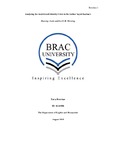| dc.contributor.advisor | Saba, Anika | |
| dc.contributor.author | Rowshan, Faria | |
| dc.date.accessioned | 2018-10-29T04:27:57Z | |
| dc.date.available | 2018-10-29T04:27:57Z | |
| dc.date.copyright | 2018 | |
| dc.date.issued | 2018-08 | |
| dc.identifier.other | ID 16363006 | |
| dc.identifier.uri | http://hdl.handle.net/10361/10779 | |
| dc.description | This thesis is submitted in partial fulfillment of the requirements for the degree of Master of Arts in English, 2018. | en_US |
| dc.description | Cataloged from PDF version of thesis. | |
| dc.description | Includes bibliographical references (pages 47-50). | |
| dc.description.abstract | "Israeli Arab”, how humiliating is this name no matter how many will try to soften it. And
frankly, it makes no difference if we call ourselves instead "Palestinian citizens of Israel" or
even "the Palestinian minority”…Whatever specific name is used, the underlining message
remains the same: "Israeli Arab" - an oxymoron.
- Sayed Kashua, (So Humiliating Is This Name)
As an Arab-Israeli, author Sayed Kashua asks the important questions: whether the indigenous
Arabs of Israel are permitted to consider Israel as their home. The author shades light into the
subaltern lives of the Arab/Palestinian-Israeli citizens in the ethnocratic Israel, where one’s
national and ethnic identity collide. The contemporary Hebrew writer narrates the sociopolitical
situation of the community along with its social segregation and hierarchy, the duality
of identity, and the politics of language and narratives. Kashua comments as well as criticises
the state of Israel, Arab world and Arab mentality and annihilates the established stereotypes
in a profoundly personal but anecdote manner. This thesis investigates Kashua’s book Dancing
Arab and Let It Be Morning from the lenses of historical past, to study and analyse the
unfamiliar stories of the Arab minority in Israel affected by the endless Palestinian-Israel
conflict in the light of literary and critical theory.
Rowshan 6
Epigraph
No need to hear your voice when I can talk about you better than you can speak about yourself.
No need to hear your voice. Only tell me about your pain. I want to know your story. And then
I will tell it back to you in a new way. Tell it back to you in such a way that it has become
mine, my own. Re-writing you I write myself anew. I am still author, authority. I am still
colonizer the speaking subject and you are now at the center of my talk.
(bell hooks, ‘Marginality as a site of resistance’, 1990: 241–3) | en_US |
| dc.description.statementofresponsibility | Faria Rowshan | |
| dc.format.extent | 50 pages | |
| dc.language.iso | en | en_US |
| dc.publisher | BRAC University | en_US |
| dc.rights | BRAC University thesis are protected by copyright. They may be viewed from this source for any purpose, but reproduction or distribution in any format is prohibited without written permission. | |
| dc.subject | Israeli Arab | en_US |
| dc.subject | Let It Be Morning | en_US |
| dc.subject | Dancing Arabs | en_US |
| dc.subject | Sayed Kashua | en_US |
| dc.title | Analysing the Arab-Israeli identity crisis in the author Sayed Kashua’s Dancing Arabs and Let It Be Morning | en_US |
| dc.type | Thesis | en_US |
| dc.contributor.department | Department of English and Humanities, BRAC University | |
| dc.description.degree | M.A. in English | |

